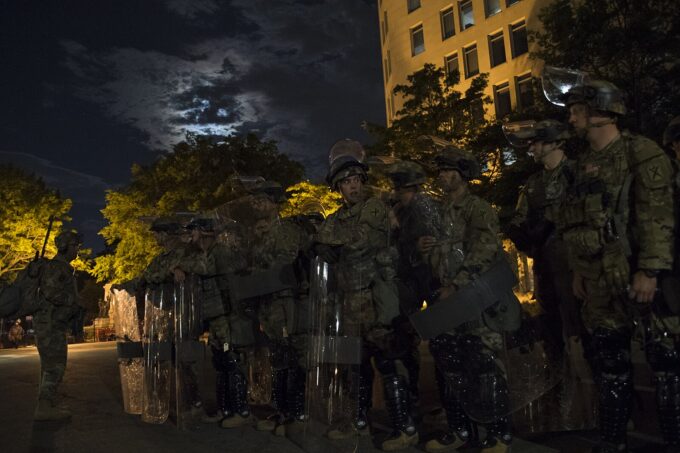The United States vetoed a resolution to accept the State of Palestine as a full member of the United Nations. Of the 15 members of the security council, 12 voted in favour, 2 abstained and the US opposed.
April 19, 2024
The US has vetoed a UN Security Council (UNSC) resolution that would have paved the way for the State of Palestine to gain full membership at the UN. The vote, held during a lengthy session in New York yesterday, saw 12 countries vote in favour of the resolution, while Britain and Switzerland abstained.
Robert Wood, the US deputy envoy to the UN, defended the veto, stating that Washington believes the only path to Palestinian statehood is through direct negotiations between Israelis and Palestinians.
The US has overseen direct negotiations since the 1990s with the Oslo Accords marking the beginning of formal negotiations between Israel and the Palestinian Liberation Organisation (PLO). Direct negotiations failed to deliver Palestinians the dream of statehood and instead under US watch, Israel further entrenched its illegal occupation and annexed the very territory set aside for a Palestinian state.
The resolution’s failure was widely anticipated, as the US, a staunch ally of Israel, holds veto power at the Security Council and had previously expressed opposition to its passage. The vote comes amid the ongoing Israeli aggression in Gaza, which has claimed the lives of nearly 34,000 Palestinians, the overwhelming majority of whom are women and children, and created a humanitarian crisis in the coastal enclave.
Read: Slovenia, Spain prioritise recognition of Palestinian State
Currently, the State of Palestine holds non-member observer status at the UN. To become a full UN member, an application must be approved by the Security Council and then gain support from at least two-thirds of the General Assembly.
Ziad Abu Amr, the UN special representative for the State of Palestine, appealed for support before the vote, emphasising Palestinians’ longing for self-determination, freedom, security and peace in an independent state.
Some 139 countries have recognised the state of Palestine and a positive vote in the Security Council would have been an expression of the will of the international community. Israel, aided by the diplomatic cover of Washington, has been hostile to the international consensus.
Israel’s hostility was on display yesterday when the ambassador of the apartheid state to the UN, Gilad Erdan, slammed the council for even considering a resolution on the recognition of a Palestinian state. “If this resolution passes – God forbid – this should no longer be known as the Security Council but as the ‘terror’ council,” he said.
Abu Amr dismissed the US claim that the resolution would jeopardise political negotiations and prospects for peace, citing the establishment of the state of Israel through UN Resolution 181 as a precedent. Israel along with several other countries gained recognition through a vote in the General Assembly and according to one opinion Palestinians can bypass Washington’s obstruction in a similar manner.
Despite the setback, Abu Amr expressed hope that the international community would grant Palestinians the opportunity to become an integral part of the global effort to achieve international peace and security.
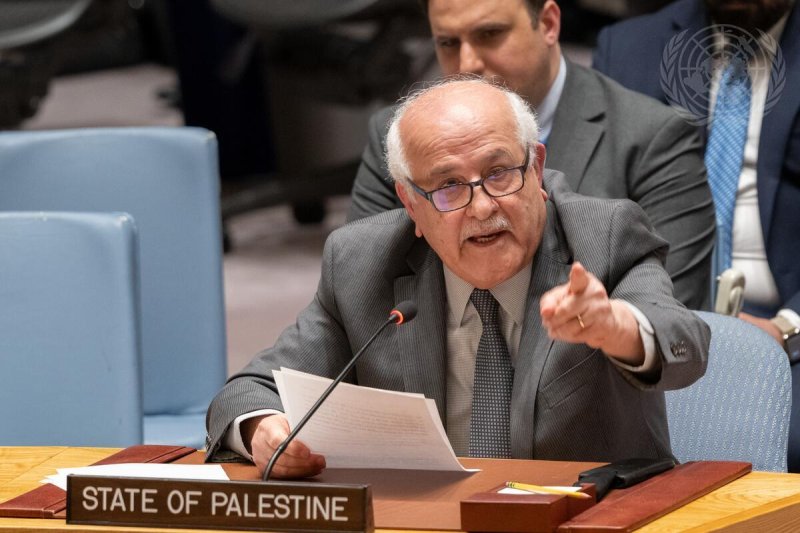
Riyad H. Mansour, Permanent Observer of the State of Palestine to the United Nations, addresses the Security Council meeting on the admission of new members. He spoke after a resolution on the admission of Palestine as a UN member state failed to pass due to the veto of a permanent member of the Security Council.
April 19 (UPI) -- The United States blocked a U.N. Security Council resolution on Thursday to recognize the state of Palestine as a full member state of the United Nations, arguing its acceptance by the intergovernmental body will not equal statehood for the Palestinian people.
The Algeria-submitted resolution received 12 votes in favor, two abstentions from Britain and Switzerland and a vote against by the United States, which is one of five permanent members of the 15-member Security Council with veto power.
The vote prevents the resolution from moving on to the 193-member General Assembly where another round of balloting would have been held on the admission of the state of Palestine, which is one of two non-member observers of the intergovernmental organization, along with the Holy See.
An emotional Riyad Mansour, the Palestinian Authority's ambassador to the United Nations, choked back tears during his remarks following the vote.
"Our right to self-determination has never once been the subject of bargaining or negotiation. Our right to self-determination is a natural right, an historic right, a legal right to live in our homeland, Palestine as an independent state that is free and that is sovereign," he said.
"We we will not disappear. The people of Palestine will not be buried."
The state of Palestine first submitted its request to join the United Nations in 2011, which failed to get off the ground, but worked in the government receiving observer status in November the following.
Its application was revitalized amid Israel's war against Hamas in Gaza, which began Oct. 7, when the Iran proxy militia launched a brutal surprise attack on the Middle Eastern country, killing 1,200 Israelis with another 253 taken hostage.
The war has put renewed attention on the lack of a Palestinian state, as the death toll of the war in Gaza has ballooned to nearly 34,000 dead, and more than 76,000 injured. Much of the enclave has also been razed by months of bombing, and as of Sunday, some 1.7 million Gazans, or more than 75% of its population, have been displaced, according to the United Nations Palestinian relief agency.
Both the United Nations and the United States back the creation of the two separate independent and sovereign states of Israel and Palestine as the answer to the Israel-Palestinian conflict, and Washington defended its veto Thursday because acceptance into the intergovernmental body will not bring about this two-state solution.
"We also have long been clear that premature actions here in New York, even with the best intentions, will not achieve statehood for the Palestinian people," Robert Wood, U.S. deputy ambassador to the United Nations, said during the meeting.
"It remains the U.S. view that the most expeditious path toward statehood for the Palestinian people is through direct negotiations between Israel and the Palestinian Authority with the support of the United States and other partners."
He pointed out that the report the council received from the admission committee that the members lacked unanimity if the state of Palestine met the criteria for membership under the U.N. Charter.
"We have long called on the Palestinian Authority to undertake necessary reforms to help establish the attributes of readiness for statehood and note that Hamas -- a terrorist organization -- is currently exerting power and influence in Gaza, an integral part of the state envisioned in this resolution," he said.
In Washington, State Department spokesman Vedant Patel further explained that they believe the most expeditious way for the Palestinians to achieve statehood is through negotiations.
He told reporters during the press conference that due to statutory requirements, admission of the State of Palestine would require the United States to cease funding for the United Nations.
"The U.S. is committed to intensifying its engagement on this issue with the Palestinians and the rest of the region, not only to address the current crisis in Gaza but to advance a political settlement here that we think can create a path to Palestinian statehood and membership in the United Nations," he said.
Israel commended the United States for downing the resolution.
"The proposal to recognize a Palestinian state, more than 6 months after the largest massacre of Jews since the Holocaust and after the sexual crimes and other atrocities committed by Hamas terrorists, was a reward for terrorism," Israeli Foreign Affairs Minister Israel Katz said in a statement.
"Terrorism will not be rewarded."
ByVertika Kanaujia
Apr 19, 2024
Why did United States block Palestine statehood bid at UNSC? Here's all you need to know
On Thursday, the United States stood alone in opposing a United Nations Security Council resolution to grant the Palestinian territories full UN membership and statehood. The U.S. vetoed the proposal put forward by Algeria on behalf of Arab nations, resulting in the resolution's failure. While twelve of the 15 council members voted in favour, Britain and Switzerland abstained.

Had the resolution passed, it would have moved to the U.N. General Assembly, where a two-thirds majority among the 193 member countries would be required for approval. Currently, around 140 U.N. members recognize the Palestinian territories as a state.
HT launches Crick-it, a one stop destination to catch Cricket, anytime, anywhere. Explore now!
Why did US oppose Palestine statehood at UNSC?
U.S. officials have argued that endorsing statehood at this time could jeopardize the chances of achieving a lasting peace agreement between Israel and the Palestinians. It insists a mutually agreed-upon solution is essential.
“President Biden has consistently emphasized that a lasting peace in the region hinges on a two-state solution reached through mutual agreement,” U.S. representative Robert Wood told the council. “This is the only path that ensures Israel’s security and its future as a democratic Jewish state, while also guaranteeing Palestinians can live in peace and dignity in their own state.
“We also have long been clear that a premature action here in New York, even with the best intentions, will not achieve statehood for the Palestinian people,” Wood said. The United States “fully shared responsibility with its Israeli allies for the deaths of tens of thousands of Palestinian civilians.”
Even before the vote it was widely anticipated that Biden would veto the resolution. The resolution needed nine out of 15 votes for passage and no veto from any permanent member, including the U.S. The administration had actively encouraged members to either vote against or abstain from the resolution to prevent a veto.
Council Members opposed US views on rejecting bid
Despite this stance, the majority of the council disagreed. Many argued that the U.S., due to its unwavering support for Israel, shares responsibility for the ongoing challenges faced by the Palestinian people. Russian Ambassador Vasily Nebenzya criticized the U.S. veto as an attempt to resist the inevitable course of history.
Despite the U.S.'s strong stance, even its closest allies on the council did not support the veto. Britain, for instance, explained its abstention by saying that while they support Palestinian statehood, such recognition should be part of a broader process.
Algeria, the resolution's sponsor, remained resolute, declaring their commitment to the cause until it's achieved.
How Palestine called out US bluff at UNSC
Ziad Abu Amr, representing Palestinian Authority President Mahmoud Abbas, pointed out that the same 1947 UN resolution that established Israel also called for a Palestinian state. He questioned how granting Palestinian statehood could hinder peace efforts.
“How could granting the state of Palestine full membership of the United Nations ... damage the prospects of peace between Palestinians and Israelis” or international peace? Abu Amr asked. “To those who say that recognizing a Palestinian state must happen through negotiations and not through a U.N. resolution, we wonder again, how was the state of Israel established.”
Israel’s U.N. Ambassador Gilad Erdan vehemently opposed the resolution, dismissing the idea of a Palestinian state meeting membership criteria.
Turkish deputy foreign minister calls for cease-fire in Gaza as soon as possible, Palestine's full UN membership and two-state solution
AA
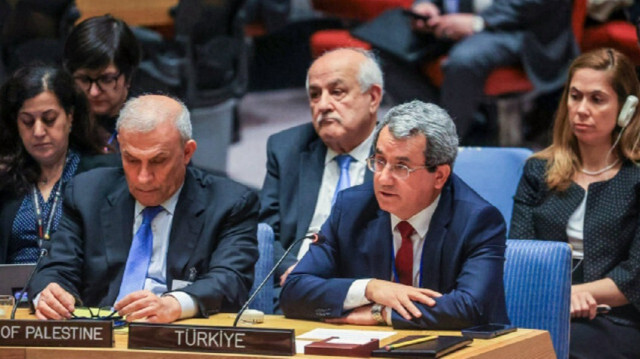
Türkiye's Deputy Foreign Minister Ahmet Yildiz
Türkiye's Deputy Foreign Minister Ahmet Yildiz on Thursday criticized reports of US plans to veto a draft resolution demanding Palestine's full membership at the UN, saying it is "shameful."
Speaking to Anadolu in an exclusive interview, Yildiz commented on the possibility of a US veto prior to a meeting of the UN Security Council to vote on the resolution.
"A cease-fire (in Gaza) should be reached as soon as possible. Palestine should become a full member (of the UN), and negotiations towards a two-state solution must be initiated with the help of the international community," Yildiz said.
Yildiz said full membership would be a good start for Palestine.
"But it seems that the US will veto it, and of course, it is a shameful situation."
He further expressed deep concern over the deteriorating situation in Gaza, citing widespread destruction and a staggering death toll of nearly 40,000.
Emphasizing the urgent need for international unity in pressuring for a cease-fire, Yildiz noted that while everyone criticizes Israel, there are countries that have reservations and objections when it comes to recognizing Palestine.
He highlighted discussions surrounding the vital role of the UN agency for Palestinian refugees, or UNRWA, in supporting Palestinian refugees and denounced attempts to defund or dismantle the organization.
"The (Israeli) occupation forces in Palestine consistently violate international law and fail to meet their obligations," he said.
"It is evident that the current occupation cannot continue. We advocate for Palestine's full membership and urge the international community to initiate negotiations for a two-state solution.”
As expected, the US later vetoed the UN Security Council draft resolution.
The 15-member Council gathered in New York to vote on a draft resolution authored by Algeria recommending the admission of the State of Palestine for UN membership.
The membership was blocked with a vote of 12 in favor and two abstentions, including the UK and Switzerland.
Palestine denounces US veto blocking full UN membership bid
Move ‘unfair, unethical and unjustifiable, challenging the will of the international community,' says Palestinian Presidency
19/04/2024 Friday
AA
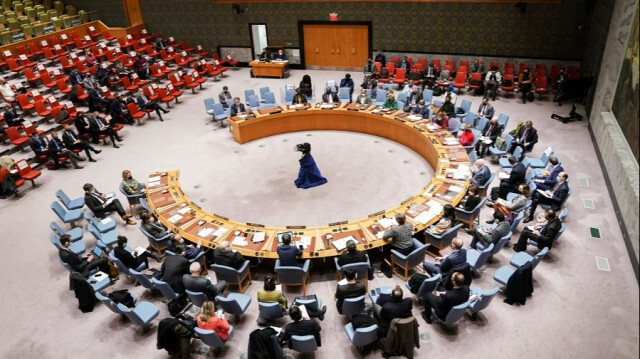
File photo
Palestine strongly condemned a decision by the US to veto a UN Security Council draft resolution Thursday demanding Palestine's full membership in the United Nations.
In a statement, the Palestinian Presidency called the move ''unfair, unethical and unjustifiable, challenging the will of the international community.''
It emphasized that this aggressive American policy towards Palestine, its people and their legitimate rights constitutes a blatant violation of international law.
It also noted that the US veto encourages the continuation of Israel's genocidal war against the Palestinian people in Gaza and the West Bank, including occupied Jerusalem.
The Presidency underscored that the veto exposes the contradictions in US policy, which claims to support a two-state solution to the Israeli-Palestinian conflict while preventing the international community from implementing this solution through its repeated use of the veto.
The 15-member UN Security Council gathered in New York to vote on a draft resolution authored by Algeria recommending the admission of the State of Palestine for UN membership.
The membership was blocked with a vote of 12 in favor and two abstentions, including the UK and Switzerland.
Before the voting, Algeria's envoy to the UN Amar Bendjama said it is time for Palestine to take its rightful place among the community of nations, and seeking UN membership is a fundamental expression of Palestinian self-determination.
Palestine was accepted as an observer state of the UN General Assembly in 2012, allowing its envoy to participate in debates and UN organizations but without a vote.
States are admitted to membership in the UN by a decision of the General Assembly upon the recommendation of the Security Council, according to the UN Charter.
A council resolution needs at least nine votes in favor and no vetoes by the permanent members -- US, Britain, France, Russia or China -- to pass.
Palestine's application for full UN membership comes amid a deadly Israeli offensive on the Gaza Strip since an Oct. 7 cross-border attack by the Palestinian group Hamas, which has killed nearly 34,000 Palestinians.
UAE regrets Security Council failure to adopt full UN membership for Palestine
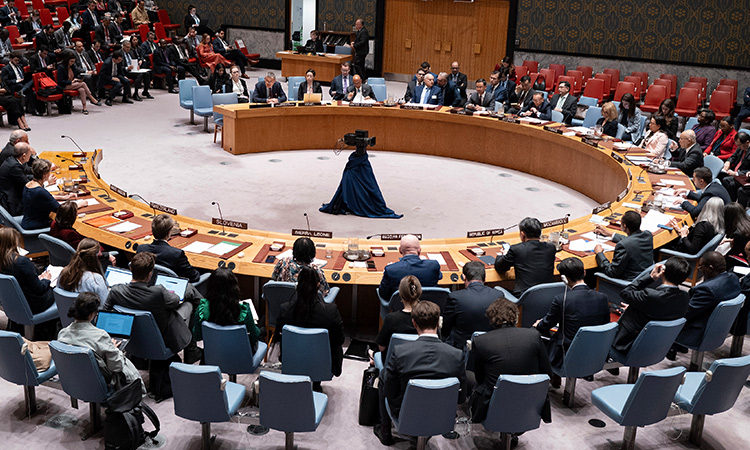
Draft resolution demanding Palestine's full membership at UN
'Ireland fully supports UN membership and will vote in favour of any UNGA resolution to that end,' says Irish foreign minister
Burak Bir |19.04.2024 -
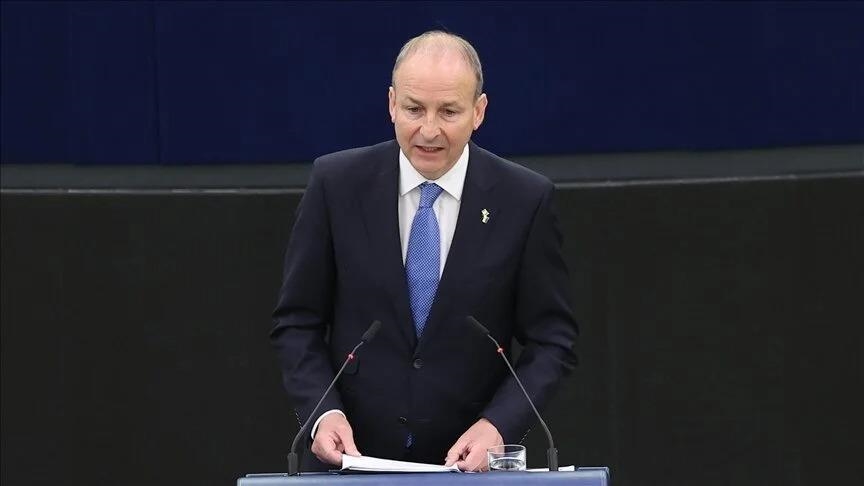
LONDON
Ireland is "disappointed" at failure of Security Council vote demanding Palestine's full membership at UN, the country's foreign minister said Thursday.
"Disappointed at outcome of UN Security Council vote on Palestinian UN membership. It is past time for Palestine to take its rightful place amongst the nations of the world," Micheal Martin wrote on X.
His reaction came just after the US vetoes UN Security Council draft resolution that demanding Palestine's full membership at the UN.
The membership was blocked with a vote of 12 in favor and two abstentions, including the UK and Switzerland.
"Ireland fully supports UN membership and will vote in favour of any UNGA resolution to that end," he added.
Ireland is among a few European nations, including Spain that already committed to recognizing the Palestinian state.
Chinese envoy criticizes questioning of Palestine's eligibility for UN membership
A Chinese envoy on Thursday strongly criticized countries that question Palestine's eligibility for UN membership under the UN Charter, emphasizing that statehood is an "inalienable national right" of the Palestinian people.
During his statement following a vote in which the United States vetoed a draft resolution for Palestine's full membership to the UN, Fu Cong, China's permanent representative to the United Nations, expressed profound disappointment.
"Today is a sad day," because the US veto has ruthlessly dashed "the decades-long dream of the Palestinian people," he said.
Fu highlighted the contradiction in the arguments presented by some nations regarding Palestine's governance capabilities.
"The claim that the State of Palestine does not have the capacity to govern does not align with the reality on the ground," he said, noting significant changes over the past 13 years, including the expansion of settlements in the West Bank.
"Palestine's survival space as a state has been constantly squeezed, and the foundation of the two-state solution has been continuously eroded," he added, condemning what he described as "gangster logic that confuses right and wrong."
Additionally, Fu condemned the implications made by some countries that questioned whether Palestine is a peace-loving state, a criterion for UN membership. "Such an allegation is outrageous and a step too far," Fu said.
He further criticized the political calculations behind opposing Palestine's full membership, suggesting, "If it is out of political calculation to oppose Palestine's full membership of the UN, it would be better to simply say so, instead of making excuses to re-victimize the Palestinian people."
On the broader implications of denying Palestine full membership, Fu argued that this action puts the cart before the horse, especially as "the Israeli side is rejecting the two-state solution more and more clearly."
He advocated for Palestine's full membership as a means to grant it equal status with Israel, which could help create conditions for the resumption of negotiations.
"The wheel of history is rolling forward, and the trend of the times is irresistible," Fu said, expressing confidence that "the day will come when the State of Palestine will enjoy the same rights as other member states at the UN, and the two states of Palestine and Israel will be able to live side by side in peace."
Fu reaffirmed China's commitment to continuing its efforts and playing a constructive role in realizing this vision, hoping for a future where "the Palestinian and Israeli peoples can live in tranquility and happiness."
